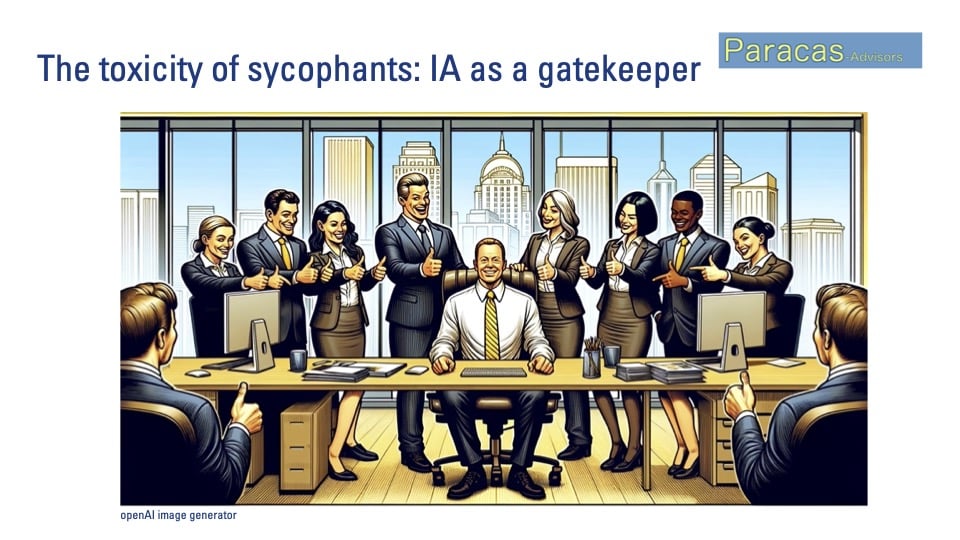
The toxicity of sycophants: Internal Audit as a gatekeeper
Over the weekend, I found this one-year-old article called « The Danger of Surrounding Yourself with Sycophants in Business – Having business (and personal) relationships with sycophants can be dangerous and could seriously harm your business » by Stephanie Dillon, published by Rolling Stone. https://www.rollingstone.com/culture-council/articles/danger-of-surrounding-yourself-with-sycophants-in-business-1234683509/
In my career, either as CAE or CCO, but also when I was « on the other side of fence » as Board of Management member or CEO of large organizations, I have witnessed the toxicity of sycophants, individuals who use flattery to gain personal advantage. In the corporate world, the presence of sycophants at the senior executive level can undermine organizational health. A CEO, surrounded with « yes people », is challenged by the echo chamber effect, and risks becoming insulated from the operational realities and challenges that the company faces.
The Internal Audit function has a key role as a gatekeeper against such pitfalls. The CAE has the advantage, but also the responsibility, to « have a voice »: sometimes a dissenting one, and always a fact-based view on the corporate health.
Echo chamber effect:
When a CEO or a leadership team are surrounded with sycophants, an echo chamber is created: only agreeable opinions and feedback are voiced. This environment limits the diversity of thought, as dissenting viewpoints are discouraged or outright dismissed. External consulting resources can prove to be a double-edged sword as their independence is not always guaranteed.
· It leads to a distorted or inaccurate view of the company’s operations, as the information reaching the CEO is overly optimistic or skewed. This misrepresentation can result in strategic mistakes,
· It breeds a culture of conformity. Innovation is limited because employees are incentivized to agree with the status quo rather than propose novel solutions. The lack of critical feedback and constructive criticism can hamper the organization’s ability to adapt in a competitive landscape.
Operational disconnect and its consequences:
I have worked in very large entities with up to 9 hierarchical levels between the CEO and the first staff level. Sycophancy reinforces a possible operational disconnect in numerous detrimental ways:
· Decision-making becomes myopic, focusing on short-term gains or appeasing the CEO’s perspectives rather than addressing long-term strategic needs. This shortsightedness can lead to missed opportunities, inefficient resource allocation, and an inability to foresee market changes.
· The morale and motivation of employees who value transparency and meritocracy plummet, as they witness the success of those who engage in sycophantic behaviors. This erosion of trust and respect within the organization undermines team cohesion and can lead to increased turnover, especially among those who could offer valuable insights and constructive challenges to the status quo.
The role of Internal Audit as a gatekeeper
Internal audit plays a crucial role in mitigating the risks associated with an echo chamber at the executive level. As an objective and independent function, internal audit evaluates and provides assurance on the adequacy and effectiveness of governance, risk management, and control processes. By doing so, it acts as a gatekeeper, ensuring that the organization’s leadership is not operating in a vacuum but is instead making informed decisions based on comprehensive and unbiased assessments.
Internal auditors facilitate transparency and accountability, challenging the status quo and encouraging a culture of honest feedback and continuous improvement. Their work is essential in bridging the gap between senior executives and operational realities, helping to prevent the adverse effects of sycophancy.
A CEO who is insulated from reality by an entourage of « yes people » is deprived of the crucial, unvarnished insights needed to navigate the company effectively. Breaking free from this cycle requires a conscious effort to foster a culture of openness, where diverse opinions are not only encouraged but valued. By prioritizing honest, critical feedback over flattering affirmations and leveraging the role of internal audit as a gatekeeper, leaders can ensure they remain connected to the operational realities of their business, paving the way for sustainable success.
Otras Notas
- ECB on non-financial risks: severe conclusions from the annual analysis on outsourcing
- An Inspiring idea from Michael Diekmann, former Allianz Group CEO
- AML-CFT: 4 reasons to be optimistic about a stronger impact
- Evaluation of a Corporate Compliance Program – the DOJ approach
- An Inspiring idea from Paul Boyle and James Turner, former Aviva and Prudential Plc CAEs